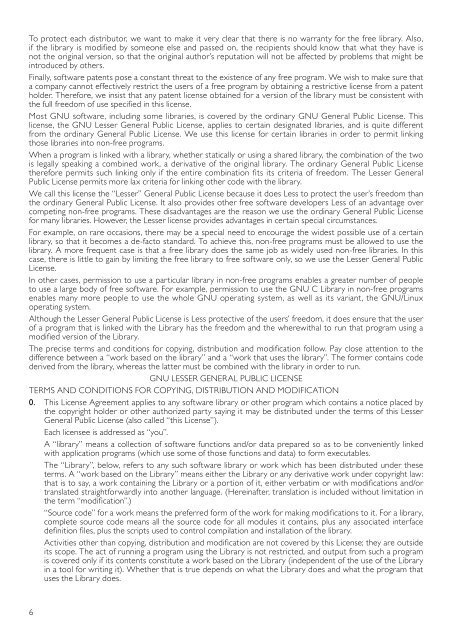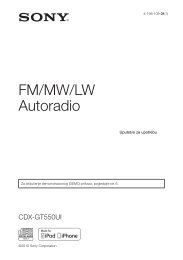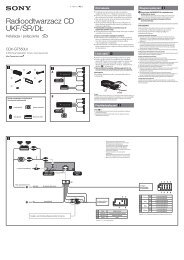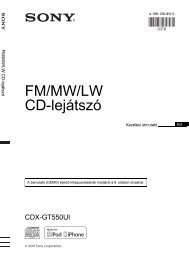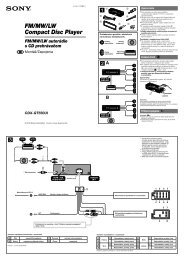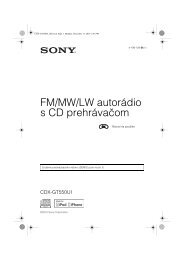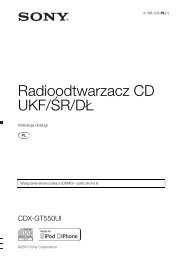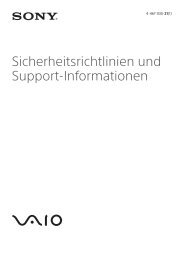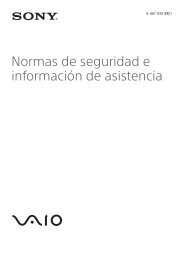Philips 9000 series Lecteur de disques Blu-ray - Mode d’emploi - SWE
Philips 9000 series Lecteur de disques Blu-ray - Mode d’emploi - SWE
Philips 9000 series Lecteur de disques Blu-ray - Mode d’emploi - SWE
You also want an ePaper? Increase the reach of your titles
YUMPU automatically turns print PDFs into web optimized ePapers that Google loves.
To protect each distributor, we want to make it very clear that there is no warranty for the free library. Also,<br />
if the library is modified by someone else and passed on, the recipients should know that what they have is<br />
not the original version, so that the original author’s reputation will not be affected by problems that might be<br />
introduced by others.<br />
Finally, software patents pose a constant threat to the existence of any free program. We wish to make sure that<br />
a company cannot effectively restrict the users of a free program by obtaining a restrictive license from a patent<br />
hol<strong>de</strong>r. Therefore, we insist that any patent license obtained for a version of the library must be consistent with<br />
the full freedom of use specified in this license.<br />
Most GNU software, including some libraries, is covered by the ordinary GNU General Public License. This<br />
license, the GNU Lesser General Public License, applies to certain <strong>de</strong>signated libraries, and is quite different<br />
from the ordinary General Public License. We use this license for certain libraries in or<strong>de</strong>r to permit linking<br />
those libraries into non-free programs.<br />
When a program is linked with a library, whether statically or using a shared library, the combination of the two<br />
is legally speaking a combined work, a <strong>de</strong>rivative of the original library. The ordinary General Public License<br />
therefore permits such linking only if the entire combination fits its criteria of freedom. The Lesser General<br />
Public License permits more lax criteria for linking other co<strong>de</strong> with the library.<br />
We call this license the “Lesser” General Public License because it does Less to protect the user’s freedom than<br />
the ordinary General Public License. It also provi<strong>de</strong>s other free software <strong>de</strong>velopers Less of an advantage over<br />
competing non-free programs. These disadvantages are the reason we use the ordinary General Public License<br />
for many libraries. However, the Lesser license provi<strong>de</strong>s advantages in certain special circumstances.<br />
For example, on rare occasions, there may be a special need to encourage the wi<strong>de</strong>st possible use of a certain<br />
library, so that it becomes a <strong>de</strong>-facto standard. To achieve this, non-free programs must be allowed to use the<br />
library. A more frequent case is that a free library does the same job as wi<strong>de</strong>ly used non-free libraries. In this<br />
case, there is little to gain by limiting the free library to free software only, so we use the Lesser General Public<br />
License.<br />
In other cases, permission to use a particular library in non-free programs enables a greater number of people<br />
to use a large body of free software. For example, permission to use the GNU C Library in non-free programs<br />
enables many more people to use the whole GNU operating system, as well as its variant, the GNU/Linux<br />
operating system.<br />
Although the Lesser General Public License is Less protective of the users’ freedom, it does ensure that the user<br />
of a program that is linked with the Library has the freedom and the wherewithal to run that program using a<br />
modified version of the Library.<br />
The precise terms and conditions for copying, distribution and modification follow. Pay close attention to the<br />
difference between a “work based on the library” and a “work that uses the library”. The former contains co<strong>de</strong><br />
<strong>de</strong>rived from the library, whereas the latter must be combined with the library in or<strong>de</strong>r to run.<br />
GNU LESSER GENERAL PUBLIC LICENSE<br />
TERMS AND CONDITIONS FOR COPYING, DISTRIBUTION AND MODIFICATION<br />
0. This License Agreement applies to any software library or other program which contains a notice placed by<br />
the copyright hol<strong>de</strong>r or other authorized party saying it may be distributed un<strong>de</strong>r the terms of this Lesser<br />
General Public License (also called “this License”).<br />
Each licensee is addressed as “you”.<br />
A “library” means a collection of software functions and/or data prepared so as to be conveniently linked<br />
with application programs (which use some of those functions and data) to form executables.<br />
The “Library”, below, refers to any such software library or work which has been distributed un<strong>de</strong>r these<br />
terms. A “work based on the Library” means either the Library or any <strong>de</strong>rivative work un<strong>de</strong>r copyright law:<br />
that is to say, a work containing the Library or a portion of it, either verbatim or with modifications and/or<br />
translated straightforwardly into another language. (Hereinafter, translation is inclu<strong>de</strong>d without limitation in<br />
the term “modification”.)<br />
“Source co<strong>de</strong>” for a work means the preferred form of the work for making modifications to it. For a library,<br />
complete source co<strong>de</strong> means all the source co<strong>de</strong> for all modules it contains, plus any associated interface<br />
<strong>de</strong>finition files, plus the scripts used to control compilation and installation of the library.<br />
Activities other than copying, distribution and modification are not covered by this License; they are outsi<strong>de</strong><br />
its scope. The act of running a program using the Library is not restricted, and output from such a program<br />
is covered only if its contents constitute a work based on the Library (in<strong>de</strong>pen<strong>de</strong>nt of the use of the Library<br />
in a tool for writing it). Whether that is true <strong>de</strong>pends on what the Library does and what the program that<br />
uses the Library does.<br />
6


